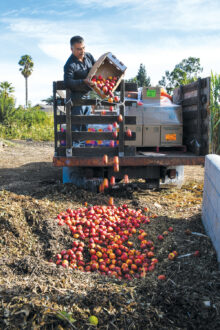GRIFFIN, Georgia -- The USDA recognizes the impacts of food loss and food waste on food security and the environment. USDA, in concert with agency partners, is working toward the goal of reducing food loss and food waste by 50 percent by 2030.
In the latest effort in reduction activities, Sustainable Agriculture Research and Education (SARE) is leading a national Community Foods Project (CFP) Food Loss and Waste (FLW) Training and Technical Assistance (T&TA) Grants Program. The program supports projects that align with USDA activities aimed at reducing food loss and reducing food waste, getting surplus wholesome food to individuals, and developing linkages between food producers, providers, and food recovery organizations.
The Southern region SARE program is soliciting a national Call for Proposals for the Food Loss and Waste Training and Technical Assistance Grants. The purpose of this one-time grant opportunity is to implement outreach, training, and technical assistance efforts to build capacity for food loss and waste initiatives.
Application deadline is June 28, 2024 at 5 p.m. EST. Projects will span three (3) years, beginning on Sept. 1, 2024. Roughly two (2) to four (4) projects, capped at $1 million per proposal with an expected grant size of $500,000, are anticipated to be funded per SARE region: Southern SARE, North Central SARE, Northeast SARE, and Western SARE, so that regional priorities to addressing food loss and waste can be augmented, while allowing for national coordination and impacts. A total of $8 million is being funded nationally for the CFP Food Loss and Waste Training and Technical Assistance Grants effort.
The Call for Proposals is open to qualified applicants in the contiguous U.S., Alaska, Hawaii, and the U.S. territories of Puerto Rico, U.S. Virgin Islands, Guam, American Samoa, Micronesia, and Northern Mariana Islands.
Eligible entities whose goals and activities are centered on reducing Food Loss and Waste are invited to apply. This can include, but is not limited to, tribal organizations, non-governmental organizations (NGOs); community organizations; gleaning and food recovery organizations; public food program service providers; and academic institutions – 1862, 1890, and 1994 land-grants, Hispanic-Serving Institutions, and other colleges/universities. Applications from organizations that address food insecurity in rural, tribal, and underserved communities are encouraged.
Awards for Food Loss and Waste Training and Technical Assistance Grants will encompass a broad array of community food activities, and integrate actionable activities that reduce food waste within the local food system by keeping food in the human food supply chain and saving money for families and businesses.
The goals of the Food Loss and Waste Training and Technical Assistance Grants Program are to:
- Increase the self-reliance of communities in providing for their own food needs;
- Promote comprehensive responses to local food access, farm, and nutrition issues;
- Identify strategies for reducing food loss and waste by identifying value-added production opportunities;
- Meet specific state, local, or neighborhood food and agriculture needs for planning for long-term solutions;
- Create innovative marketing activities that mutually benefit agricultural stakeholders and consumers.
- Describe how the research or training and technical assistance will lead to improved quality of life for producers, communities and consumers.
Lisa K. Johnson, an independent consultant and a national leader in food loss and waste reduction, serves as the Food Loss and Waste Program Manager for SARE. Her extensive experience will move the work of funded projects forwarded in reducing food loss and waste throughout the food supply chain.
“I couldn’t be more thrilled to see such a generously funded food loss and waste opportunity coming from our federal agencies! The awarded projects are going to be game-changing for the wicked problem of food loss and waste, and we plan to provide guidance for replication around the country for maximum social, environmental, and economic impact,” said Johnson. “It will be a pleasure to lead this program and ensure the projects are intentional, practical, and successful. I can’t wait to meet new and seasoned food loss and waste leaders through this effort.”
Entities that are awarded Food Loss and Waste Training and Technical Assistance Grants will receive Training and Technical Assistance services through the assistance of the Food Loss Waste Program Manager, in addition to the Community Food Program Training and Technical Assistance Center (Third Sector New England). Those services may include: Assistance in project development; grantsmanship training; project evaluation; leadership development; and/or assistance on a particular type of project, such as youth enterprises, urban farms, direct marketing, and farm-to-institution methods, or other services. Activities may include, but are not limited, to workshop training, peer to peer interaction, one on one training, curricula development, webinars, and/or video-conferencing throughout the life of the grant project.
For more information about this grant opportunity, contact Lisa Johnson at FLW@sare.org
Published by the Southern Region of the Sustainable Agriculture Research and Education (SARE) program. Funded by the USDA National Institute of Food and Agriculture (NIFA), Southern SARE operates under cooperative agreements with the University of Georgia, Fort Valley State University, and the Kerr Center for Sustainable Agriculture to offer competitive grants to advance sustainable agriculture in America’s Southern region.
